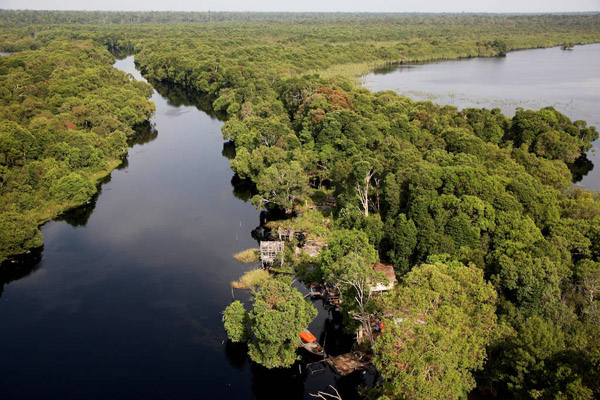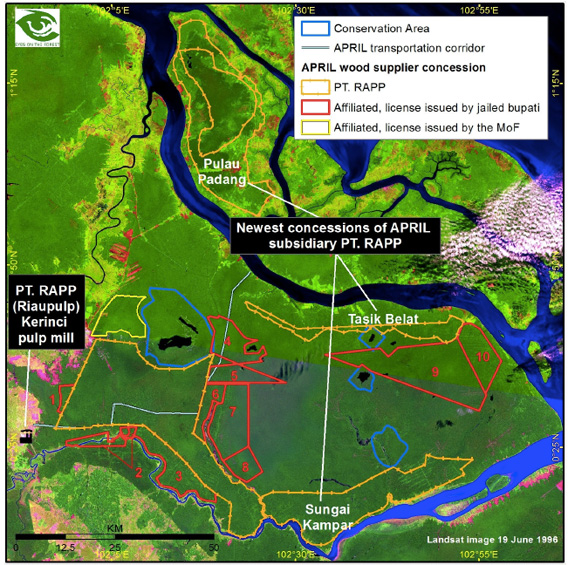Pulp and paper giant Asia Pacific Resources International Limited (APRIL) has launched a $7 million ecosystem restoration project to restore and protect over 20,000 hectares of peat forest in Indonesia’s Riau province, Mongabay-Indonesia reported last week.
The company, through its subsidiary PT Gemilang Cipta Nusantara, has a 60-year ecosystem restoration license to carry out the project, which aims to restore and manage a 20,265-hectare degraded forest area on the Kampar Peninsula on the island of Sumatra.
Restorasi Ekosistem Riau (RER), a non-profit organization started by APRIL earlier this year, will manage the Kampar Peninsula project in conjunction with international conservation group Fauna & Flora International; Bidara, a non-governmental organization focusing on social capital in rural communities; and Daemeter, a consulting firm that promotes sustainable management of natural resources in Indonesia.

Kampar peninsula. Photo: Greenpeace Indonesia
However a coalition of local environmental groups has called the new project “greenwashing” and questioned the circumstances under which the license was granted.
The Ministry of Forestry initially rejected APRIL’s license application, however shortly after the election of a new district head in Pelalawan, where the concession is located, the local government issued a recommendation in support of the project and the license was pushed through, despite overlapping with proposed community forest areas.
APRIL subsidiary PT Riau Andalan Pulp and Paper (PT RAPP) has been implicated in a number of corruption cases regarding forest concession permits in the area, which Indonesia Corruption Watch said has cost the state $96.5 million in losses. Moeslim Rasyid, coordinator for Forest Rescue Network Riau (Jikalahari), believes the Ministry of Forestry’s sudden change of heart indicates that the company may have used similar tactics to secure the Restorasi Ekosistem Riau permit. “This is an indication that the mode of corporate crime in the forestry sector continues to this day in Pelalawan,” he said.
Jikalahari, together with a number of other environmental, anti-corruption and agrarian rights groups in the province, also accused PT RAPP of clearing forests on Riau’s Padang island despite a Ministry of Forestry order that the company suspend all activities in the area. The island is the site of a long-running conflict between the company and the local community, which has protested its operations since it entered the area in 2009.

Source: Eyes on the Forest
In January last year, the Ministry of Forestry ordered the company to halt all exploitation activities on Padang island until further notice. However, in the past two weeks local residents reported seeing over 40 pieces of heavy equipment operating on the island and three pontoon boats filled with timber, the groups said in a joint statement on May 6.
“[The ecosystem restoration program by APRIL] is a form of greenwashing. On the one hand, they say they are protecting the forest, but on the other hand the heavy equipment of PT RAPP on Pandang island is ready to devastate the natural forests. The public must know, the ecosystems restoration area is an area that was previously reserved as village forests by the Ministry of Forestry,” Moeslim said.
Ecosystem restoration concessions in Indonesia are meant to facilitate an alternative use for degraded production forests – areas previously zoned for logging concessions. The Ministry of Forestry grants ecosystem restoration licenses to private companies who aim to restore degraded forests to their natural state through financially viable non-timber business models. This can mean setting up a conservation area funded through donations, developing an ecotourism site, selling carbon credits or extracting non-timber forest products such as rattan and bamboo.
However despite interest from the private sector, the ministry has been slow to process licenses. The Restorasi Ekosistem Riau project marks just the fifth such license the Ministry of Forestry has granted since the restoration concessions were created in 2004. Other ecosystem restoration projects currently underway in Indonesia include the Rimba Raya project in Central Kalimantan and BirdLife International’s “Hutan Harapan” (Forest of Hope) in Jambi province on Sumatra.
Related articles